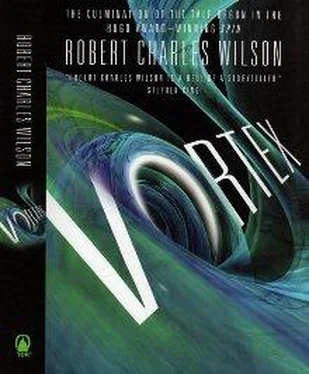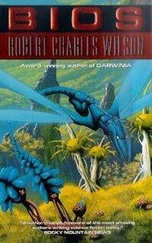Rigorous, but not rigorous enough. Because here was a secret I had told no one: even before the Network went down, even before the rebel Farmers destroyed my node, Allison had been bleeding into Treya. And Treya had never objected, nor had she complained to her administrative handlers. Instead Treya had kept the steady drip of Allison Pearl into her daily life a secret—a guilty secret, because there were qualities in Allison that Treya had coveted for herself.
Treya was obedient. Allison was defiant. Treya was willing to submerge her identity in the greater identity of Vox. Allison would sooner have died. Treya believed everything she was told by duly anointed authorities. Allison distrusted all authority, on principle.
But even that distinction falls short of absolute truth. Better to say that, through Allison, Treya had begun to discover the possibilities of skepticism, defiance, rebellion.
So ask again. What was I, now that the door between Treya and Allison had been thrown wide open? Was I Allison, or was I Treya being Allison?
No! Neither. I was a third thing.
I was what I had made of myself from all these incompatible parts, and I was entitled to all my memories, real and virtual. Vox had cultivated both Treya and Allison, but Vox hadn’t counted on the consequences of the mixture. And fuck Vox, anyway! There it was, the heresy Treya had always resisted and for which the voice of Allison had silently begged: Fuck Vox, fuck its quiet tyranny, fuck its frozen dream religion, and fuck its craven obsession with the Hypotheticals.
Fuck especially the madness that had brought Vox to this ruined Earth, and fuck the more profound madness I believed was about to break loose aboard her.
Fuck Vox! And bless Allison Pearl for making it possible to say so.
* * *
Though Oscar had agreed to withdraw the surgical knives, he hadn’t abandoned the project of convincing me to submit to surgery. He conducted the campaign secondhand, confronting me with people I couldn’t refuse to speak to, people who were or had been Treya’s friends and family.
They were my friends and family, too, in a real sense, though I wasn’t the person they had known, much less the person they wanted and expected me to be. And I was human enough to be hurt by their incomprehension and their grief.
One day Oscar brought my mother (Treya’s mother) to see me. My father (my Vox-father) was an engineering worker who had been killed in the collapse of an exchange tunnel not long after I was born. As a child I had been cared for by my mother and a crew of aunts, all of whom loved me and whom I had loved. And enough of Treya remained in me that I couldn’t help reaching out to the woman whose arms had so often comforted me, couldn’t help looking into her terrified eyes while I told her no, her daughter wasn’t dead, only transformed, freed from a harsh but invisible bondage. She understood none of it. “Don’t you want to be useful ?” she asked me. “Don’t you remember what it means to be part of a family?”
I remembered altogether too well. I ignored the question and told her I still loved her. And truly, I did. But she wasn’t consoled. Why should she be? She had lost her daughter. Treya was gone, and I was just some stubborn golem who had taken her place. And in the moment I told her I loved her, I saw from her frozen expression that she hated me in return, actually hated me; that the person she loved wasn’t me but a shadow I had ceased to cast.
Well, maybe she was right. I would never be the daughter she had known. I was what I had become. I was the thing I was and the name of the thing I was was Allison, Allison, Allison Pearl . I whispered it to myself long after she had left the room.
I didn’t mean to take these troubles to Turk. Turk had troubles of his own. He wore his stoic come-what-may attitude proudly, and I guessed he had earned it, but fundamentally, inescapably, he was alone here, a stranger in what must have seemed to him a terrifyingly strange land. Our rooms adjoined, and some nights I woke to hear him pacing or mumbling to himself, confronting fears I couldn’t imagine. It seemed to me that he must feel like a man trapped in a dream, aware of the lunacy of it but helpless to break through to a saner reality.
I tried not to pin my own hopes and fears on him. But I couldn’t help thinking that for all our differences we were more alike than not. I found myself wondering whether he might have crossed paths with Allison Pearl back in the impossibly distant twenty-first century, some chance encounter in a faceless American crowd. Surely if anyone in Vox Core was equipped to understand Allison Pearl, it was Turk. So maybe it wasn’t surprising that on one of those nights when neither of us could sleep I went into his room for comfort. We talked at first, the kind of talk we could have with no one but ourselves, intimacies shared not because of but despite what we knew about each other. “I am the thing most like you in the world,” I said, “and you’re the thing most like me,” at which point it was inevitable that we would go to bed and take some solace there, and in the end I didn’t care what the walls might hear or to whom they might whisper their dangerous secrets.
In the morning I toured him through Vox Core, heel to head.
Of course he couldn’t see all of it, or even more than a representative fraction. Vox Core above ground was the size of a modest twenty-first-century city. Below ground, in the hollow of the island, it was bigger: unravel all those complex spaces onto a two-dimensional grid and it would have been the size of Connecticut or maybe even California. We avoided the damaged zones that were still being decontaminated and rode vertical transit downward. We paused whenever the tube walls allowed a broad perspective, so Turk could see the plazas and terraces and tiers, the wide agricultural levels bathed in artificial daylight, the dormitory complexes set like alabaster chips in forested wildspaces.
Then I took him to the lowest levels of Vox, the engineering decks. The engines that drove Vox were immense—more a territory than an object—but I showed him reactor units the size of small towns, bathed in an eternal wash of desalinated water; I showed him a shadowy acreage of mu-metal chambers in which magnetic fields directed flows of molten iron; I led him past superconductive field coils around which moisture condensed like snow and was swept away in gales of forced air. Turk was awed, which would play well with the administrators who were no doubt monitoring us. There were ears in the walls even here.
But there were no ears where I took him next. We rode a transit stem up as far as it would go, then transferred to a smaller transport that slid up the spine of Vox’s tallest tower. Two more transfers and we arrived at the highest accessible public platform in Vox Core, essentially a roof with a view.
Back when Vox had sailed the oceans of habitable worlds, this platform had not been enclosed. Now an osmotic perimeter had been established—I told Turk it was a “force field,” a quaint and inaccurate term but one he more or less understood. “It doesn’t seem to be working too well,” he said. “Smells a little like a pig farm out here.”
I guessed it did. The air was rank and windless, though we could see clouds speeding past aloft, seemingly close enough to touch. I felt sick with vertigo even before we approached the rim. For the first time I almost regretted the loss of my node: missed its calming presence, an invisible anchor. I felt as if a brisk wind would carry me away.
Vox was moving steadily south by southeast, out of the Indian Ocean and into the South Pacific. The sea here was faintly purple to every horizon, the sky a poisonous shade of ocher. I hated the look of it.
Читать дальше












